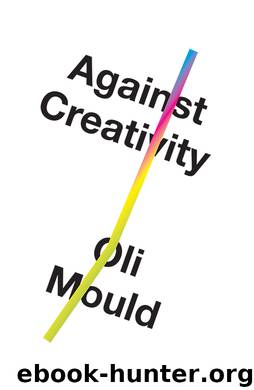Against Creativity by Oli Mould

Author:Oli Mould
Language: eng
Format: epub
Publisher: Verso Books
Algorithmic Creativity
Every interaction we have with these technological interfaces produces yet another set of data. As we move around the city, swipe in and out of the subway, order food, message a friend, take a photo of our dinner, order shopping for our smart fridge, swipe right for a late night rendezvous – all these actions are encoded by the technologies that facilitate them. Ones and zeros stream from our daily routine onto the servers of tech companies all over the world. The exabytes of data produced hourly become treasure troves for those wanting to know more about how to commercialize our everyday lives.
This ‘big data’ is unmanageable, and indeed, unfathomable by human eyes and minds. Hence, software has been developed to scour this information and design ever more creative ways of using it to get us to engage in producing more of the same kind of data. The onset of big data has led some commentators to proclaim that ‘data is the new oil’ but this new oil has to be drilled for and extracted.12 And this is where algorithms come in.
An algorithm is simply a set of rules that dictate particular behaviours. One of nature’s most magnificent sights, the murmuration of flocking starlings, occurs because of the algorithmic behaviour of each individual bird. Every starling will fly as close as they can to the wing of the next, copying any movement to maintain proximity. But tiny deviations in one bird’s movement ripple through the flock, creating the mesmeric swirling and contortion of the mass of starlings.
Within the realm of technology, an algorithm is simply a piece of computational code. It is a programmed instruction (or set of instructions) that dictates an action. There are algorithms embedded with the source code of our web browsers that scour the videos we watch online, and suggest other videos that we might also want to watch. There are algorithms that dictate how we can better bypass traffic on our satellite navigation apps. There are even algorithms that can dictate what food you should eat in the evenings based on your daily activities.
This type of programming brings with it a huge potential for societal progress, development and justice. Take, for example, one of the biggest killers in the world, cardiac arrest (more than 300,000 people die from cardiac arrests in the US every year). Most people will view them as sudden, unexpected events, but the body gives off very subtle clues before they occur. Predicting them has been extremely difficult for human doctors, but a team from Chicago have developed an algorithm that tracks the minute changes of twenty-eight variables (including previous admission patterns, food consumption and so on) and predicts which patients are more likely to suffer an arrest and crucially, when that might be.13 Similar artificially intelligent software has been developed in Oxford in the UK, which is performing far better than human consultants in picking up the signals of heart attacks and predicting lung cancer. Beyond healthcare, algorithms are used
Download
This site does not store any files on its server. We only index and link to content provided by other sites. Please contact the content providers to delete copyright contents if any and email us, we'll remove relevant links or contents immediately.
Big Magic: Creative Living Beyond Fear by Elizabeth Gilbert(5742)
Paper Towns by Green John(5173)
On Writing A Memoir of the Craft by Stephen King(4924)
The Doodle Revolution by Sunni Brown(4739)
Hyperfocus by Chris Bailey(4108)
Evolve Your Brain by Joe Dispenza(3659)
Unlabel: Selling You Without Selling Out by Marc Ecko(3642)
The Red Files by Lee Winter(3409)
Draw Your Day by Samantha Dion Baker(3341)
The Power of Mindful Learning by Ellen J. Langer(3213)
The Art of Dramatic Writing: Its Basis in the Creative Interpretation of Human Motives by Egri Lajos(3057)
The War Of Art by Steven Pressfield(2938)
Applied Empathy by Michael Ventura(2884)
The 46 Rules of Genius: An Innovator's Guide to Creativity (Voices That Matter) by Marty Neumeier(2832)
How to be More Interesting by Edward De Bono(2787)
Keep Going by Austin Kleon(2751)
Why I Am Not a Feminist by Jessa Crispin(2737)
How to Stop Worrying and Start Living by Dale Carnegie(2704)
You Are Not So Smart by David McRaney(2641)
